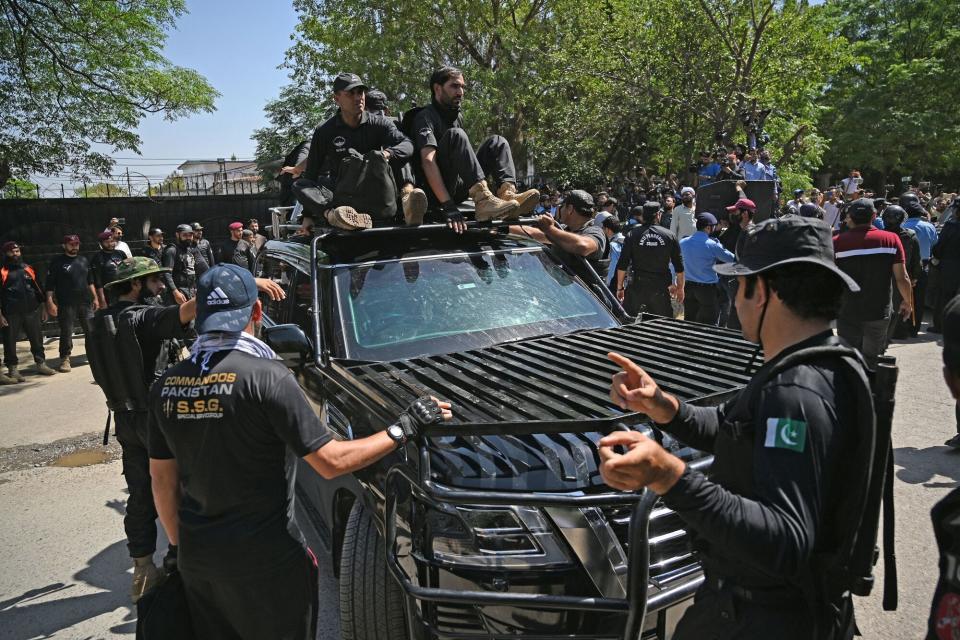Imran Khan Arrest in Graft Case Sparks Violence in Pakistan
(Bloomberg) -- Protesters clashed with authorities in several cities across Pakistan, including attacks directed at the powerful military, after former premier Imran Khan was arrested as part of a graft probe, escalating the cash-strapped country’s political crisis.
Most Read from Bloomberg
Steve Schwarzman Holds Off Giving Money to DeSantis After Meeting Him
US Inflation Shows Signs of Moderating, Giving Fed Room to Pause
Vanguard’s Trillion-Dollar Man Leads a Fixed-Income Revolution
Violence broke out Tuesday after Khan, 70, was detained in the capital Islamabad and taken to the National Accountability Bureau’s headquarters. A video shared by his party showed dozens of paramilitary troops from the Pakistan Rangers escorting Khan into a black SUV, while others beat back some of his supporters in a court complex.
A separate video from his party, Pakistan Tehreek-e-Insaf, showed supporters, some with sticks and face masks, entering the army’s headquarters in the garrison city of Rawalpindi. Protesters also stormed the official residence of the top regional commander in Lahore, a rare breach of an area controlled by the military. Both sites were later cleared.
Protesters set fire to at least three buildings across the country, while police said dozens of supporters have been arrested. Khan’s party reported at least four people were killed and 20 injured in separate clashes. Amid the protests, mobile broadband services were suspended on the orders of the interior ministry, according to the Pakistan Telecommunication Authority, while complaints of slow internet service spread on social media.
“The arrest marks a major escalation in a long-running confrontation between Imran Khan and the civilian and military leadership,” said Michael Kugelman, director of the South Asia Institute at the Washington-based Wilson Center.
Read more: How Imran Khan’s Power Struggle Fuels Pakistan Crisis: QuickTake
The arrest followed soon after Khan repeated earlier allegations that a senior military officer was behind his assassination attempt last year and “given that Khan was detained by paramilitary forces, this was likely the military acting directly. But if so, the civilian leadership, given their long and ugly vendetta with Khan, surely backed the move,” Kugelman added.
Khan’s party said he was arrested Tuesday in connection with a graft investigation involving a plot of land.
The Islamabad High Court said late Tuesday that the arrest was legal, according Khan’s lawyer, Intazar Hussain Panjutha. The NAB will present Khan in a special court Wednesday and request to keep him in custody to assist with the investigation, which will be challenged, Panjutha said.
The NAB has been used as a tool to go after political opponents in the past. Former premier Shahid Khaqan Abbasi and Finance Minister Miftah Ismail were kept in custody for months before being released and found innocent.
Khan faces a slew of court cases and was set to be formally indicted Wednesday in a case that involved allegations that he did not properly disclose earnings from the sale of state gifts from his time in office.
The government has no control over the NAB, Interior Minister Rana Sanaullah said at a press conference in Islamabad. “Khan has done corruption that is clearly documented. This and state-gift selling case are both evidence.”
Pakistan’s dollar bonds pared earlier gains, with the security due April 2024 retreating to 50.1 cents on the dollar from as high as 51.3 earlier Tuesday, after news of the arrest. The nation’s rupee fell 0.35%, the most in a month, at close. Its benchmark KSE-100 Index fell by 1.1% at close, the most in almost seven weeks.
“More protests, more disruption, more violence, and more political and economic dysfunction is on the way,” said Hasnain Malik, a strategist at Tellimer in Dubai. “Taking the painful decisions the economy needs and holding orderly elections will become even harder now.”
The latest upheaval comes as Pakistan is grappling with an economy in deep distress. Moody’s Investors Service has warned the nation could default without an International Monetary Fund bailout as its financing options beyond June are uncertain. It downgraded the nation’s rating to an all-time low earlier this year.
Prime Minister Shehbaz Sharif, who traveled to London to attended the coronation of King Charles III, decided to delay his return to Pakistan until Wednesday, Information Minister Marriyum Aurangzeb said Tuesday morning before the arrest, citing the need for consultations on political and national issues.
Islamabad is struggling to restart a $6.5 billion bailout program from the Washington-based lender, which has stalled after the government failed to meet some loan conditions. Political tensions will only add to the risks of a delay.
Over the weekend, Khan had once again accused the nation’s powerful military of being behind at least two attempts to murder him, focusing on the alleged involvement of a senior official from the Inter-Service Intelligence, or ISI, which oversees Pakistan’s internal security.
The army had slammed his remarks and asked him to address the matter in court.
The politician is agitating for early elections after getting ousted in April 2022 in a no-confidence vote. Emboldened by strong support in opinion polls and rallies, Khan has shown no signs of backing down against the government and the army and is seeking support from the Supreme Court to hold polls in two provinces for a start.
The arrest could backfire on Shehbaz Sharif’s government, Kugelman said.
“It could stoke unrest, intensify public fury against the government, anger key Pakistani partners like China that have called for reduced tensions, and raise serious concerns among bilateral donors and the IMF.”
--With assistance from Ismail Dilawar, Netty Ismail, Srinivasan Sivabalan and Maria Elena Vizcaino.
(Updates with details of protests in third paragraph.)
Most Read from Bloomberg Businessweek
AI Drug Discovery Is a $50 Billion Opportunity for Big Pharma
‘Nearshoring’ Push Is Fueling Tech Job Demand in Latin America
©2023 Bloomberg L.P.




